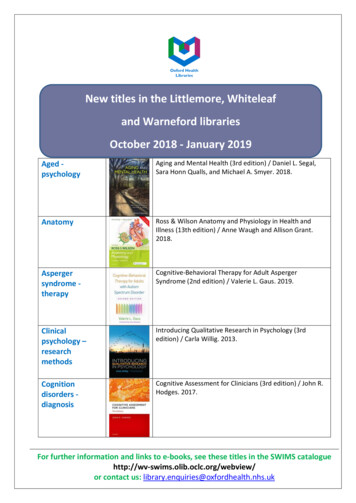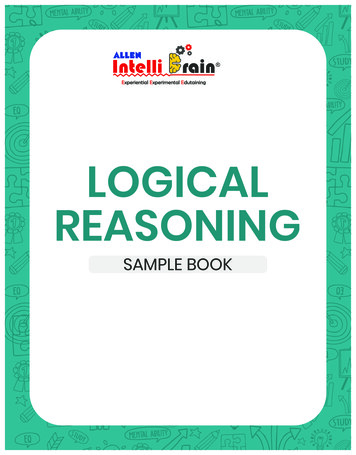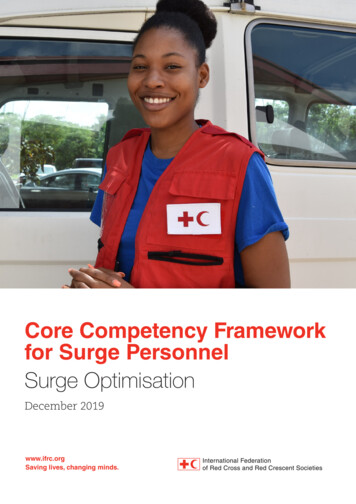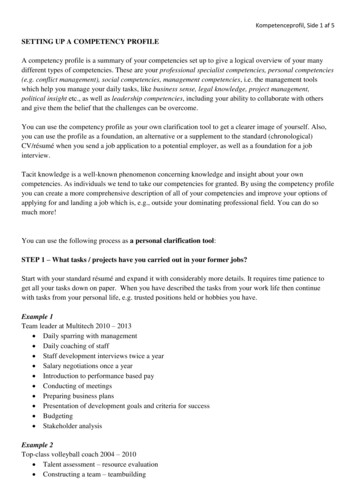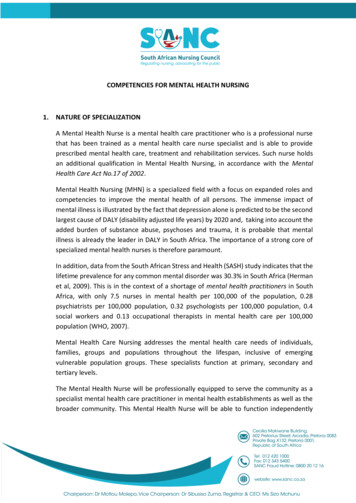
Transcription
COMPETENCIES FOR MENTAL HEALTH NURSING1.NATURE OF SPECIALIZATIONA Mental Health Nurse is a mental health care practitioner who is a professional nursethat has been trained as a mental health care nurse specialist and is able to provideprescribed mental health care, treatment and rehabilitation services. Such nurse holdsan additional qualification in Mental Health Nursing, in accordance with the MentalHealth Care Act No.17 of 2002.Mental Health Nursing (MHN) is a specialized field with a focus on expanded roles andcompetencies to improve the mental health of all persons. The immense impact ofmental illness is illustrated by the fact that depression alone is predicted to be the secondlargest cause of DALY (disability adjusted life years) by 2020 and, taking into account theadded burden of substance abuse, psychoses and trauma, it is probable that mentalillness is already the leader in DALY in South Africa. The importance of a strong core ofspecialized mental health nurses is therefore paramount.In addition, data from the South African Stress and Health (SASH) study indicates that thelifetime prevalence for any common mental disorder was 30.3% in South Africa (Hermanet al, 2009). This is in the context of a shortage of mental health practitioners in SouthAfrica, with only 7.5 nurses in mental health per 100,000 of the population, 0.28psychiatrists per 100,000 population, 0.32 psychologists per 100,000 population, 0.4social workers and 0.13 occupational therapists in mental health care per 100,000population (WHO, 2007).Mental Health Care Nursing addresses the mental health care needs of individuals,families, groups and populations throughout the lifespan, inclusive of emergingvulnerable population groups. These specialists function at primary, secondary andtertiary levels.The Mental Health Nurse will be professionally equipped to serve the community as aspecialist mental health care practitioner in mental health establishments as well as thebroader community. This Mental Health Nurse will be able to function independently
with basic, intermediate and advanced clinical competencies which are recognised bothnationally and internationally in the mental health care environment. In the mentalhealth facilities and the broader community, they will perform as independent,interdependent and dependant mental health practitioners, leaders and consultants inproviding evidence-based care to patients, their families/ significant others and thecommunity, as set out by the relevant legislative frameworks.The Mental Health Nurse will be able to: Function competently and professionally in the mental health care environment. Have a range of skills, inclusive of critical thinking and clinical reasoning skills,knowledge and attitudes to enable him/her to make a meaningful contribution tothe mental health services, the community and policy development. Display a high standard of ethical principles, inclusive of equity and justice, toensure accountability. Provide primary, secondary and tertiary care to mental health care users, theirfamilies and the community through all phases of mental illness, commencing atthe prodromal phase through to re-integration into the community; therebyinvolving prevention of mental illness, promotion of mental health care andtreatment to rehabilitation, using a recovery supportive approach. Work as a specialist practitioner with other team members within the health caresystem, inclusive of policy makers, the mental health care user, the family andcommunity stakeholders (including traditional healers). Identify practice gaps and implement research to contribute to practice and policydevelopment.2.MENTAL HEALTH NURSINGA Mental Health Nurse functions wherever there are people. As statistics show, one inevery four people will develop mental illness during their lifetime, therefore the need fora Mental Health Nurse is essential everywhere (Herman et al. 2009). According to theMental Health Care Act, the mental health environment includes health establishments,institutions, facilities, buildings or places where persons receive care, treatment orrehabilitative assistance, diagnostic or therapeutic interventions or other health services,and includes facilities such as community health and rehabilitation centres, clinics,hospitals and psychiatric hospitals. Services are rendered to health care users, theirfamilies and the communities. In addition to the above, they work in policy development,research, education and as beneficiaries of scholarships.Mental Health Nurses are recognized as responsible and accountable professionals whowork in partnership with inter-professional and multidisciplinary teams as well as thecommunity, to provide comprehensive mental health care to all people. This careincludes assessment/screening and preventative measures, management and rendering2
of care, the promotion of mental health and the identification of people at risk, toimplement preventive measures, treatment and rehabilitation.The Mental Health Nurse can carries out the following core skills across the lifespan: Promote mental health in all settings and to all people, addressing issues of stigmaand mental wellbeing.Critically reflect on practice and evidence, and through engaging clinical reasoningskills determine and implement mental health illness prevention strategies at aprimary, secondary and/or tertiary level.Demonstrate an in-depth knowledge of theories which underpin mental healthpractice.Identify populations at risk of mental health problems through community entry andengagement with community, to collaboratively recommend evidence-basedprevention and early detection activities as well as key mental health interventionsin community crises periods.Collaborate with the mental health care user, his/her family, the community and themultidisciplinary team to conduct evidence-based, comprehensive mental healthassessments; to diagnose, prioritise, stabilise or refer as appropriate; and to developcollaborative diagnosis care and treatment plans.Demonstrate evidence of sound clinical judgement and clinical reasoning, reflectionin-action, drawing on in-depth knowledge of the aetiology of mental illness andpsychopharmacology, to initiate appropriate management.Establish therapeutic relationships with mental health care users, their families andthe community.Conduct evidence-based mental health, and social or psychotherapeuticinterventions, inclusive of the use of m-Health (mobile) / e-Health (digital).Exercise an advocacy role in care, treatment and rehabilitation, with a recoverysupportive approach.The following guiding principles underpin all the Mental Health Nursing competencies: Mental Health Nursing is based on specialised mental and biopsychosocial healththeoretical frameworks and current evidence-based information and practices, aswell as a recovery-focused approach; A commitment to culturally sensitive, human rights based, person-centredapproaches; The inclusion of mental health across all levels of care, from promotion torehabilitation, and across the lifespan; Focuses on community, family (including significant others) and individuals; Located in international guidelines, the framework of the Mental Health Care Act No.17 of 2002 and other core South African legislation and mental health policies, and3
striving towards the National Development Plan (NDP 2030) and the United NationsStrategic Development Goal 3 (SDG 3).3.OVERLAP OF COMPETENCIESSome competencies will overlap with allied health workers, e.g. psychologists, socialworkers, occupational therapists and counsellors. There is also an overlap with therole of psychiatrists in the management of psycho-pharmacy. In addition, certainMental Health Nursing competencies can be included as a component in all nursingqualifications, as mental health is an integral part of wholeness.4.SUMMARY OF CORE COMPETENCIES* Please note that all discussed interventions also include persons with severe andprofound intellectual disability, neurological problems and substance abuse.DOMAIN 1: PROFESSIONAL, ETHICAL & LEGAL PRACTICESUBDOMAIN/COMPETENCY1.1.CORE SPECIFIC COMPETENCYProfessionalPractice1.1.1 Accept accountability for increased responsibility, including ownprofessional judgment, actions, outcomes of care, ethical practiceand continued competence in accordance with legislation and policyframeworks (both nationally and internationally).1.1.2 Recognize and practise within the professional, ethical and legalparameters of the Mental Health Nurse as a mental health carepractitioner.1.1.3 Recognize own level of competence and limitations in order to takeactions as a Mental Health Nurse.1.1.4Collaborate with the mental health care user, his/her family(including significant others), the community and themultidisciplinary team to ensure a team-based approach, andconsults with or refers to appropriate other aid sources when4
encountering situations beyond own competence, and ensuresimplementation of evidence-based mental health care practice.1.1.5 Recognize and respect different levels of accountability for the rangeof available health care professionals, fostering professionalautonomy.1.1.6 Lead and participate in activities related to improving access to therange of mental health care services required for effective specialistservices.1.1.7 Engage in continuous professional development, utilising formal andinformal platforms, by reflecting and recognising own level ofcompetence and limitations; and seek development opportunitiesand record development activities to provide evidence of lifelonglearning.1.1.8 Commit to the development of peers, students and other categoriesof healthcare providers by creating a healthy practice environmentthat promotes and fosters professional growth and resilience.1.1.9 Actively participate in activities and affairs of professionalassociations and regulatory bodies to advocate for professionalmatters and mental health care (specifically mental health carenursing) in the development of legislation and policies, including theimprovement of mental health care practices.1.2EthicalPractice1.2.1 Deliver mental health care in a manner that preserves and protectsthe autonomy, dignity, rights, values, beliefs and preferences of themental health care practitioner, users and their family/significantothers, and the community.1.2.2 Participate in ethical and legal debates concerning complex decisionsand orders in the mental health setting, for example: involuntarypatients and care of forensic mental health care users, vulnerablepopulations, and including research activities.1.2.3 Acknowledge the significance and contribution of the mental healthcare user (MHCU), the family/significant others and the community5
in ethical decision making in conjunction with the multidisciplinaryteam, and assisting them to make informed decisions.1.2.4 Maintain and advocate for the autonomy and confidentiality of theMHCU and his/her family within the legal and ethical framework, toprotect MHCU confidentiality and adhere to relevant legislationwhich governs the privacy, access, use, retention and disclosure ofpersonal information.1.2.5 Intervene, in accordance with legislative guidance, in cases of illegal,unethical or inappropriate behaviour that expose the MHCU to risk.1.2.6 Participate in and advocate for the MHCU, family/ significant others,the community and the profession in all aspects of decision making,especially in respect of ethical dilemmas, and serve as a mentor androle model by participating in the resolution of ethical and clinicaldilemmas.1.2.7 Advocate for Mental Health Nurses and other auxiliary staff inaddressing risks and safety concerns in mental health settings,including the community; promoting advancement and positivepractice environments, whilst recognising limitations and scope ofpractice; and counteract the stigma of mental illness while creatingawareness about the epidemic of mental illness.1.2.8 Identify, mitigate and manage potential and actual medico-legal risksin the mental health setting, and the reporting thereof to the relevantauthorities.1.2.9 Display sensitivity to cultural, professional, lifestyle and technologicaldiversity within the multidisciplinary team and mental health/ illnesscontinuum, and promote cultural and lifestyle sensitive care.1.4.10 Maintain confidentiality and security of written, verbal andelectronic information acquired.1.4.11 Promote the recovery and the responsible re-integration of MHCUsback into the community.6
1.3. LegalPractice13.1 Practice in accordance with professional and other relevant legislationapplicable to mental health nursing and mental health care.1.3.2 Recognise and act upon legislation relating to the professional roleand/or professional code of conduct.1.3.3 Practice in accordance with current mental health care policies andevidence-based procedural guidelines and protocols.1.3.4 Interpret and evaluate current regulations to develop or implementclinical practice guidelines and policies for situations of violence,neglect and abuse, and any other relevant emerging areas ofidentified need.1.3.5 Demonstrate knowledge of all relevant legislation (national andinternational) which may impact on mental health care nursingpractice.1.3.6 Demonstrate knowledge of mental health legislation in terms ofadmission, transfer, discharge and rehabilitation under the MentalHealth Care Act No. 17 of 2002.DOMAIN 2: CARE PROVISION AND MANAGEMENTSUBDOMAIN/COMPETENCYCORE SPECIFIC COMPETENCY2.1. Healthpromotion andillnessprevention2.1.1 Promote mental health in all settings through inter-sectoralcollaboration and engagement, to create awareness and addressissues such as minimising stigma and discrimination, mental healthliteracy, mental wellbeing, healthy lifestyles, coping mechanisms andresilience, thereby building capacity and social capital.2.1.2 Conduct analyses of mental health needs to identify populations atrisk of mental health problems, to recommend evidence basedprevention, screening and early detection activities.2.1.3 Critically reflect on social determinants of mental illness,epidemiological studies on burden of disease, and evidence studies7
on mental health interventions, to determine and implement mentalhealth illness prevention strategies at a primary, secondary andtertiary level.2.1.4 Based on the needs assessment plans, develop and implement needsbased programmes to promote mental health and wellbeing. Theseplans can encompass psycho-education of individuals or groups ormore direct-action plans, in close co-operation with otherstakeholders.2.1.5 Develop and use follow-up systems and multidisciplinaryassessments to ensure that populations receive appropriate access tomental health services.2.1.6 Advise decision makers at local, provincial, national and internationallevels on policies affecting mental health.2.2. Clinicalcompetenciesin assessmentof mentalhealth careusers (MHCUs)2.2.1 Establish specialised theory-based therapeutic relationships withMHCU, their family and the community, and maintain personal andprofessional integrity in a therapeutic, person-centred relationship topromote goal-directed change.2.2.2 Using a culturally sensitive approach, recognize the signs andsymptoms of the mental disorders, identify problems andmaladaptive behaviour patterns, demonstrate in-depth knowledge ofthe causes and recognize and promptly and effectively interveneagainst the potential risk for self and others.2.2.3 Consider the unique age-specific aspects and specialist theory-basedassessment techniques, to inform planning, implementation andevaluation across all levels of mental health care for the vulnerablemental health population throughout the lifespan.2.2.4 Collaborate with the MHCUs, their family, the community andmultidisciplinary team (to collect collateral information) in order toconduct evidence-based, comprehensive mental health assessments,using diagnostic tools and acceptable diagnostic criteria, and orderingdiagnostic tests and procedures in line with scope of practice, to8
diagnose, prioritise, stabilise or refer – as appropriate – and developcollaborative diagnosis, care and treatment plans and rehabilitation.2.2.5 Collect, analyse data and interpret relative to physical, psychological,cultural, spiritual and social aspects of the MHCUs, family and/orcommunity health and, using the data, derive nursing diagnoses anddifferential diagnoses to collaborate with the MHCU, family and/orcommunity to formulate a care plan specific to the individual/ family/the community.2.2.6 Conduct assessment of crisis situations (psychiatric emergencies) suchas suicide or self-harm attempts, in instances of comorbidity andtrauma, and determine appropriate care plans and interventions toenhance mental health.2.2.7 Record and report the findings of mental health assessments andinterventions (paper-based and electronic) to relevant stakeholdersaccurately, completely and in a timely manner, in compliance withNursing Practice standards and institutional policies.2.3. Clinicalcompetencies:planning of care,treatment andrehabilitation ofMHCUs2.3.1 Formulate an individualized and person-centred, comprehensive careplan with identified care outcomes, based on nursing and differentialdiagnoses, findings from a comprehensive mental health assessment,inputs from other health team members and Nursing Practicestandards.2.3.2 Apply critical thinking and clinical reasoning skills, underpinned bysound clinical judgement and in-depth knowledge of the aetiology ofmental illness, mental health care practises and psychopharmacology,to initiate appropriate management to: Develop effective care plans in collaboration with MHCUs andtheir families and the communities, to adhere to a recoveryapproach for individuals, families and groups in institutions aswell as the community;Develop therapeutic programmes at local, national andinternational level;Involve communities and role-players in the planning andimplementation of activities.9
2.3.3 Consult stakeholders (inclusive of MHCU, family, community andadvocacy groups) on policies and the development of infrastructurepertaining to mental health care delivery.2.3.4 Assess, review and revise planned activities regularly, in collaborationwith MHCU, the family/community and other members of the healthcare team.2.4. Clinicalcompetencies intheimplementationof care,treatment andrehabilitation ofMHCUs2.4.1 Utilize knowledge of therapies and apply related clinical skills inworking with the mental health care user, family and/or communityto conduct a range of advanced evidence-based psychotherapeutictherapies and therapeutic programmes, in accordance with thedeveloped care plan and best practice standards for individuals,families, groups and communities; including psychosocialrehabilitation, using a recovery-based approach. Therapies will bebased on latest evidence such as psycho-education, cognitivebehavioural therapy (CBT), psychological first aid (PFA) or crisistherapy, structured family therapy etc.2.4.2 Exercise an advocacy role in care of MHCU, treatment andrehabilitation applying a recovery-supportive approach.2.4.3 Collaborate and take leadership in multidisciplinary teams andprovide coordination and seamless continuation of care for MHCUs,and provide the necessary support to the multidisciplinary teammembers according to the identified gaps in the implementedactions.2.4.4 Act as a consultant at clinical, organizational, national andinternational levels.2.4.5 Maintain currency in knowledge of pharmacology (with an emphasison psychopharmacology), the positive and negative effects of drugson a person, and the administration of drugs; and administermedication and assess the effects of medication.10
2.4.6. Utilize psychosocial rehabilitation in a goal-directed manner to fosterrecovery and physical and mental well-being of the MHCU, andenhance mental nurse/client relationships.2.4.7 Demonstrate the ability to conduct an interview, monitor mentalhealth status; and collaboratively and continuously analyse, recordand report interventions and MHCU responses to interventions andprogress, as directed by care appropriate, evidence-basedmanagement tools.2.4.8 Provide support for MHCUs and families while in care, treatment andrehabilitation to identify and assist MHCUs and families in overcomingbarriers to successful recovery (e.g. adherence, stigma, finances,accessibility, and access to social support).2.4.9 Create and maintain a therapeutic environment during all levels ofcare.2.4.10 Develop and maintain current, accurate recordkeeping systems tomanage effective communication throughout the health care system.2.4.11 Refer to other members of the multidisciplinary team whereappropriate.2.5. Essential clinicalskills in themonitoring ofcare, treatmentandrehabilitation ofMHCUs2.5.1 Monitor, record and report progress towards expected outcomesaccurately and completely, and evaluate progress towards plannedoutcomes in consultation with health care users, families and/orcarers and the health care team.2.5.2 Reflect on and review all implemented actions, to address anyshortcomings or lack of progress, and review MHCU outcomes on aregular basis.2.5.3 Utilize evaluation data and electronic record data to monitor patientimprovement and recovery.2.5.4 Demonstrate the ability to access and utilize technology to improvetreatment and care of MHCU11
2.6. Clinical practice 2.6.1 Systematic assessment of the impact of a major incident or disaster inand management in aidentifying needs, planning interventions, and providing andmajorincident,managing care in a resource-limited environment, while maintainingcombat or disastercore competencies.situation2.6.2 Care for vulnerable people and their families/ significant others in ahostile, often unsafe, unstable environment, using appropriatecompetencies. Treat people with special needs and maintain ethicaljudgement towards casualties, hostile population groups or victims ofhostile actions.2.6.3 Provide psychological first aid in times of trauma and crisis.2.6.42.7. Therapeuticcommunication &relationshipsDisplay professional development competencies, includingmonitoring, mentoring and evaluation, with a focus on competency inleadership, teamwork and coordination in the hostile environmentsetting; while maintaining accountability and legal and ethicalaspects.2.7.1 Establish and maintain rapport with the MHCU and families/significant others through therapeutic communication.2.7.2 Apply effectively the principles of facilitative and therapeuticinterpersonal skills during interaction with MHCUs, their families,groups and communities, conveying respect for diverse opinions.2.7.3 Establish effectively the principles of written, verbal and non-verbalcommunications skills within the mental health setting.2.7.4 Act as role model for and encourage person-centred communication,including MHCUs with compromised communication ability.2.7.5 Advocate for the MHCU and family in relation to all interventions andorders.2.7.6 Communicate with the family of the MHCU to orientate them aboutthe mental health care interventions, technology and changing status.12
2.7.7 Demonstrate therapeutic use of self-principles to managecomplex interpersonal situations.DOMAIN 3: PERSONAL & QUALITY OF CARESUBDOMAIN/COMPETENCYCORE SPECIFIC COMPETENCY3.1. Qualityimprovement3.1.1 Always adopt safe practice. Regularly analyse the mental health caresystem and its philosophy to align mental health nursingaccordingly, e.g. aligning with the Primary Health Care Approach andthe Mental Health Care Act No. 17 (2002).3.1.2 Collaboratively develop and analyse indicators, checklists andoutcomes to monitor for risks and unintended outcomes, theimplementation of quality initiatives and effectiveness of mentalhealth nursing practice, based on contextual variables such asadmissions, length of stay, morbidity, mortality and adverse events.3.1.3 Recognise workplace violence and aggression, and implement riskmitigation strategies for the recognition and management ofdisruptive and violent behaviour in the mental health care setting.3.1.4 Design innovations to effect change in mental health nursingpractice and improve patient outcomes through the integration ofevidence-based knowledge, skills and attitude.3.1.5 Evaluate the practice environment and quality of mental healthnursing rendered, in relation to existing evidence, feedback fromMHCU and pre-set indicators, and implement appropriatestrategies.3.1.6 Use the results of quality improvement activities to initiate changesin mental nursing practice and in the mental health care deliverysystems.13
3.2. ContinuingEducation3.2.1 Create and utilize learning opportunities for orientation andteaching of staff, MHCUs and families in the highly unfamiliar andstressful mental health care environment.3.2.2 Continuously explore and reflect on the self and staff competenceand keep themselves and staff up to date with current health issuesand health care trends in the dynamic environment of mental healthnursing.3.2.3 Maintain personal growth through active participation in enrichingsessions, to acquire clinical and professional knowledge, skills andattitudes/values.3.2.4 Apply the principles of teaching, learning and evaluation to designeducational programmes that enhance the knowledge and practiceof staff.3.2.5 As a competent and responsible member of staff, participate in thefacilitating of formal and informal education of students and staff.3.2.6 Provides frequent positive and constructive feedback in a way thatmotivates both under-performing and high-performing individuals3.2.7 Act as a competent and accountable consultant or resource personfor mental health care in the health care facility to enable staff todevelop to their full potential.3.2.8 Maintain complete and accurate clinical records (written andelectronically) that provide up to date evidence of competency andlifelong learning.3.2.9 Participate actively in formative and summative assessment ofstudents, using evidence-based assessment tool.14
DOMAIN 4: MANAGEMENT & LEADERSHIPSUBDOMAIN/COMPETENCYCORE SPECIFIC COMPETENCY4.1. Managementand Leadership4.1.1 Demonstrate professional accountability and advocacy in executingclinical, managerial and educational activities to empower staffmembers and promote quality care.4.1.2 Share, foster and translate the vision and mission of the organizationinto the practice of nursing in the mental health care setting.4.1.3 Coordinate the care, treatment and rehabilitation of MHCUs acrossthe healthcare journey, to achieve optimal outcomes within thisenvironment.4.1.4 Oversee the care treatment and rehabilitation given by staffmembers and multidisciplinary team members, while ensuringaccountability for the quality of care given to MHCUs and theirfamilies.4.1.5 Develop and implement a succession plan to ensure continuity ofcare (and mental health nursing leadership) in the mental healthnursing practice.4.1.6 Liase effectively between various parties in effort to uphold theimage of the profession and empower colleagues.4.1.7 Influence decision-making bodies to improve the mental healthnursing practice environment and patient outcomes.4.1.8 Participate in efforts to influence health care policy on behalf ofMHCUs and the profession.4.1.9 Participate in designing systems that support effective teamworkand positive outcomes in the mental health care environment.4.1.10 Manage and evaluate innovation and embrace high leadershipopportunities to facilitate change in the mental health care setting15
through encouraging creativity, problem solving and critical thinkingskills in staff.DOMAIN 5: RESEARCHSUBDOMAIN/COMPETENCYCORE SPECIFIC COMPETENCY5.1. Research5.1.1 Engage in research activities to inform evidence-based practice, inorder to improve and promote optimal patient outcomes.5.1.2. Display basic knowledge of research methods and of application ofscientific research5.1.3 Critically analyse and discuss the findings of research in the field ofmental health care within the healthcare team, and negotiate for theimplementation of relevant and appropriate applicable findings inthe mental health setting.5.1.4 Provide and translate evidence-based recommendations for MHCUinterventions.5.1.5 Participate in the evaluation of mental health series andinterventions.5.1.6 Disseminate research findings through activities such aspresentations, publications, consultations and journal clubs to avariety of audiences that include but are not limited to healthcareproviders in the mental health care setting.5. DEFINITION OF CONCEPTS, BASED ON THE MENTAL HEALTH CARE ACT, NO. 17 OF 2002CONCEPTDEFINITIONCare and rehabilitation centresHealth establishments for the care, treatment and rehabilitationof people with intellectual disabilities.Head of a health establishmentMeans a person who manages the establishment concerned.Health care providerMeans a person providing health care services.16
Health establishmentMeans institutions, facilities, buildings or places where personsreceive care, treatment, rehabilitative assistance, diagnostic ortherapeutic interventions or other health services, and includesfacilities such as community health and rehabilitation centres,clinics, hospitals and psychiatric hospitals.Mental health care practitionerMeans a psychiatrist or registered medical practitioner or anurse, occupational therapist, psychologist or social worker whohas been trained to provide prescribed mental health care,treatment and rehabilitation services.Mental health care providerMeans a person providing mental health care services to mentalhealth care users, and includes mental health care practitioners.Mental health care userMeans “a person receiving care, treatment and rehabilitationservices or using a health service at a health establishment aimedat enhancing the mental health statu
Mental Health Nursing competencies can be included as a component in all nursing qualifications, as mental health is an integral part of wholeness. 4. SUMMARY OF CORE COMPETENCIES * Please note that all discussed interventions also include persons with severe and profound intellectual disability, neurological problems and substance abuse.

